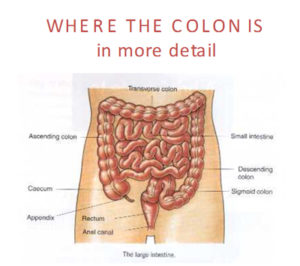Why Colonoscopy?
 Bowel cancer screening aims to detect bowel cancer at an early stage (in people with no symptoms), when treatment is more likely to be effective. Bowel cancer screening can also detect polyps (abnormal growth of tissue) which can easily be removed, reducing the risk of bowel cancer developing later on in life. Some polyps have the potential to turn into cancers over a period of time.
Bowel cancer screening aims to detect bowel cancer at an early stage (in people with no symptoms), when treatment is more likely to be effective. Bowel cancer screening can also detect polyps (abnormal growth of tissue) which can easily be removed, reducing the risk of bowel cancer developing later on in life. Some polyps have the potential to turn into cancers over a period of time.
Colonoscopy is a camera examination of the large bowel (Colon) that enables us to examine your bowel thoroughly. During Colonoscopy we are also able to take samples (biopsies) and remove polyps.
It is estimated screening for bowel cancer could save at least 1,200 lives a year as it will find polyps and cancers at an earlier, treatable stage.
About 4-5 in 10 will be found to have a polyp, which if removed may prevent cancer developing.
What is a polyp ?
The lining of the bowel is made of cells that are constantly being renewed. Sometimes these cells grow too quickly, forming a clump of cells known as a bowel polyp (sometimes known as an adenoma). Polyps are not bowel cancers (they are usually benign), but they can change into a malignant cancer over a number of years (Cancer Research, 2017).
If you are aged 75 or over, you can ask for a FOBt kit by calling the Freephone number below. Likewise, if you have been invited for bowel cancer screening, and have any questions about the kit, you should also call. If you are worried about a specific problem or symptom, or otherwise worried about the risks of bowel cancer, then you should talk to your GP.
Bowel Cancer Screening Freephone helpline: 0800 707 60 60
What happens if a cancer is detected
After your test you were made aware that a suspicious area in your bowel was discovered which unfortunately could be a cancer. A sample (biopsy) of the tissue was therefore taken for analysis.
Your doctor may also request some more investigations so you will receive:
- An appointment for a CT scan (and in some cases an MRI scan as well). These scans give the doctor’s detailed information about the affected area of the bowel and surrounding organs.
- An out-patient appointment within the next two to three weeks either with the Doctor who performed your colonoscopy, a Surgeon or a Cancer Specialist. We advise you to come to this appointment with either a family member or a friend.
By this time the specialist team (MDT – Multi Disciplinary Team) of health care workers who take care of people suspected of having cancer, will have reviewed all your test results and planned any further treatment you may need.
A Clinical Nurse Specialist (CNS) from the team will contact you by phone within 1 working day (Monday to Friday) and will meet you at your outpatient appointment. The CNS and the Consultant will be able to answer your questions, provide more information and discuss your treatment plan with you, once all the results are available.
Contacts
National
Website for the national programme – http://www.cancerscreening.nhs.uk/bowel/
National Helpline number on 0800 707 60 60.
Local
Bowel Cancer Screening office- Good Hope on 0121 424 9373
Email-bowelcancerscreening@heartofengland.nhs.uk
TWITTER- @BSOLBCS






